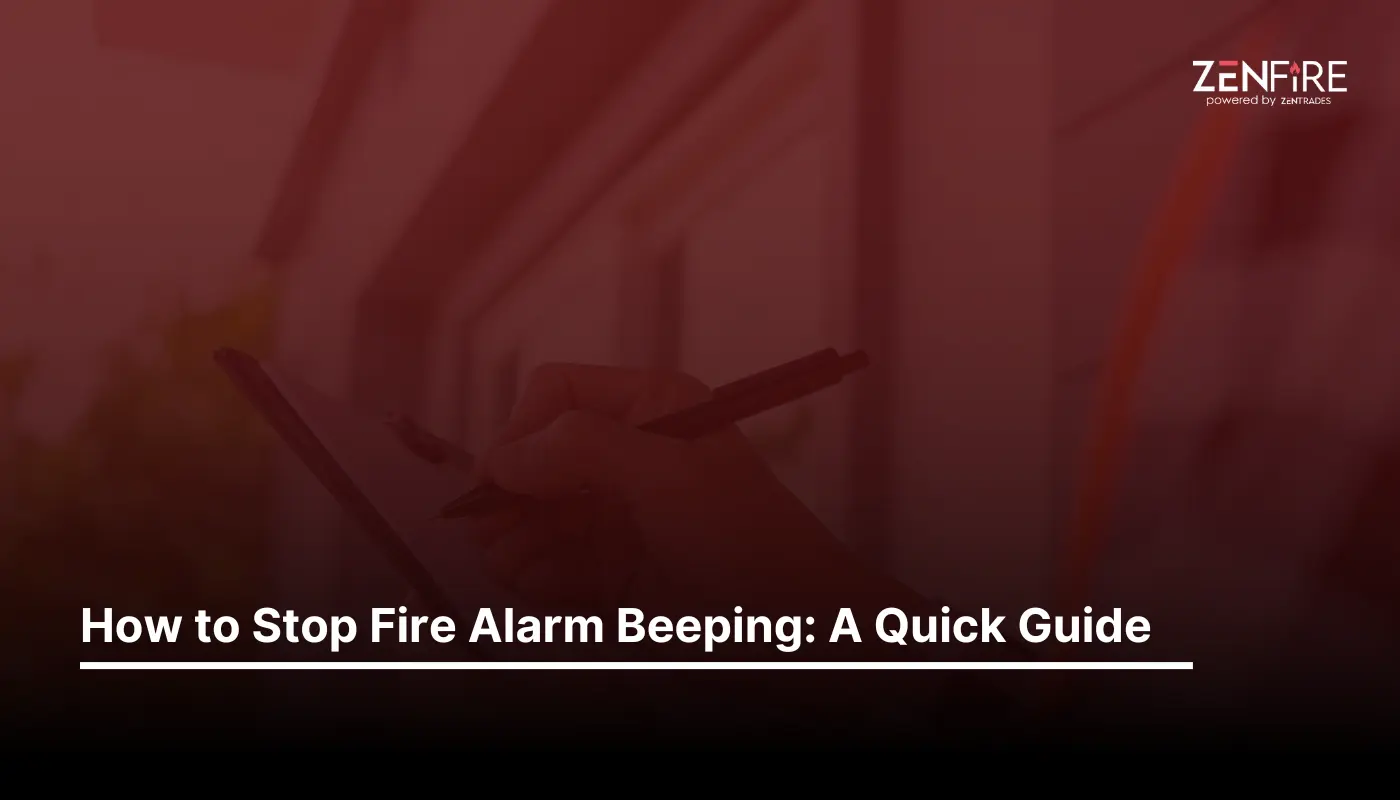How to Stop Fire Alarm Beeping: A Quick Guide
- Field Service Management
- 9 Min Read
Fire alarm beeping and chirping can be really annoying. Imagine coming home after a tiring day and being greeted by the incessant noise of your smoke alarms. Or perhaps your smoke alarm has been triggered for the past three days, and now the sound of it is acting like white noise for you, and you just know what to do other than endure the fateful and dastardly situation.
In this blog, we will guide you through the possible solutions that can assist you with turning off your smoke alarms and smoke detectors so they stop chirping and enable a tranquil environment that is not ruined by smoke detector beeps.
Here What We Cover
Understanding Smoke Detector and Smoke Alarm Beeping
Whether you have hard-wired smoke detectors or battery-operated alarms, it is viable for most smoke detectors to sometimes act up due to various reasons, such as false alarms, low battery power, dead battery, faulty backup batteries, low voltage, old battery, electrical problems, or could actually be smoke and the genuine possibility of a fire. Intermittent beeping of your smoke detector could also be caused by dirt and debris residual that needs to be cleaned, a dysfunctional power cable or power outage, or issues in the ionization sensors, sensing chamber, or the entire unit.
Your smoke detectors and alarms need proper maintenance and care to function optimally for longer. However, despite that, situations could still arise where multiple beeps from your alarm units occur without an actual emergency, such as detected smoke. This can indicate an underlying issue that needs to be checked at the earliest.

Use our free estimate template now
Make winning quotes in minutes—for any industry and any job.
Types of smoke alarms and Smoke detectors
There are various types of smoke alarms and smoke detectors that are available in the market. Depending on your occupant type, activity requirements, and fire codes, you will need to select the appropriate type of fire alarm and smoke detectors to ensure the maximum safety of your building and area.
Common Types Of Fire Alarms
Some common smoke alarms popularly found:
carbon monoxide alarms
These alarms provide dual protection, helping detect smoke and carbon monoxide and saving space for multiple alarm installations. They are expensive and need frequent inspections compared to your ionization smoke alarms.
ionization smoke alarms
Basic alarms that detect fast fire with small combustible particles are the go-to units to install in your establishments for safety and protection. Since these are quick to detect the presence of fire and smoke, they are also prone to false alarms due to cooking or smoking, which requires further inspection of your system.
photoelectric smoke alarms
These fire alarms detect the presence of fire by identifying it using a light source and sensor. Upon the dispersal of smoke, it enters the chamber, scattering the light beam, which helps trigger the alarms. These are less prone to false alarms and majorly detect the presence of smoldering fires, but if it false alarm, you must know how to turn it off..
dual sensor smoke alarms
These are a combination of your ionization and photoelectric smoke alarms that help you detect fire with the presence of smoke caused by flaming and smoldering fires. These are more expensive than your single-sensor alarms and provide an adequate protection level with an all-in-one unit.
Common Types of Smoke Detectors
Some common smoke detectors:
smart smoke detectors
These intelligent units utilize your wifi or internet connection to enable the detection of combustible substances and particles. These devices send alerts to your smartphones or other devices with remote capabilities and help you access the status of your situation virtually.
hard wired smoke detectors
These are the most common and efficient smoke detectors connected to your establishment’s electrical system. Equipped with backup batteries for continuous functioning, they are not as portable as your smart smoke detectors and need a thorough installation process due to their wire connectivity.
standalone smoke detectors
These smoke detectors are easy to maintain and do not require a centralized alarm system to function effectively. However, they operate independently, which can lead to delayed alerts due to the non-synchronization of your alarm units.
interconnected smoke detectors
These devices are more complex to install but are the most efficient systems you can have for your establishment to ensure adequate coverage for safety and protection. As the name suggests, these units are synced with your other alarm units and connected to a larger system that helps you get notified on a large scale, even if the detection is at the farthest corner of your building.
Common Types of Beeping and Chirping of Your Alarm Devices
If your alarm unit is currently beeping and you have no idea what the beep means, this section can help you figure out what is wrong with your system so that you can go ahead and adjust your unit accordingly.
Let’s decode the different types of beeps and chirps emitted by your alarm units and check out what each of them mean.
Continuos beeping
Reasons why your alarm unit can be sending out continuous beeps:
Detection of fire or smoke, or combustible particles in the air
False alarm due to cooking or steam
CO detection
Electrical Issue
Single beep every minute or half a minute
Your device can emit a single beep in 30 to 60 seconds, in a pattern or without a pattern. The reasons why it could happen:
Low Battery
Fault in the alarm unit
Dust, dirt or debris found inside the unit, affecting its sensors
single beep every 30-60 seconds with red led light
In cases where your alarm unit is sending out signals along with a red LED light, it generally means that the shelf-time of your notification device has come to an end. Fire alarm notification units need to be replaced from time to time to ensure that they provide maximum safety from accidental fires. The only solution to stop the smoke alarm from beeping is to replace the unit with a fresh one.
Common reasons for your alarms to beep
Individuals face issues with their smoke alarms and detectors for many reasons. These can vary depending on the type of device they have, the environmental conditions surrounding them, their usage, and the shelf-life of the unit.
Top reasons why most smoke alarms generally start beeping out of nowhere:
cases of false alarms
possibility of low battery power
presence of a dead battery or old battery
faulty backup batteries
electrical problems
blockage due to dirt and debris
a dysfunctional power cable or faulty wiring
low voltage or frequent power outages
issues in the ionization sensors
faulty sensing chamber
dysfunctional unit
or could actually be smoke and the genuine possibility of a fire.
Get posts like this in your inbox.
Keep learning how to run a 5-star business with our bi-weekly newsletter.
Solutions To Stop Smoke Alarms And Smoke Detectors From Beeping
For various reasons, your hardwired alarms can send out unnecessary signals due to false alarms. Below, we’ll discuss possible solutions that you can apply to stop a smoke alarm and smoke detector beeping and ensure that they are working properly again.
Battery Issues
Battery issues are the most common problem that can trigger the chirping and beeping of your alarm units. These issues are not induced in your hard-wired smoke detector unless the problem is with the battery backups. These could range from having an old battery or the wrong type of battery placed inside the unit. Low battery issues can also cause your system to alarm you, which should also be remembered.
Solution: Replace smoke alarm batteries occasionally and choose the correct type of batteries. Always check your batteries’ expiration date, and don’t wait until the last day to replace the battery backup, battery drawer maintenance check, etc. Keeping tabs on your battery levels of your smoke detector can help mitigate this issue and prevent your smoke alarm from beeping continuously.
Component Issues
Component issues could also be a vital problem that can cause your unit to malfunction. Unclosed battery drawers, defective systems, and displacement of the unit body can contribute to constant beeping, which can be troublesome for individuals. If the problem persists with the battery compartment, your smoke detector’s battery—no matter if it’s new or appropriately placed—will fail to work optimally.
Solution: Keep your compartment damage-free and avoid any chance of manual tampering. Clean your devices occasionally and examine the components before purchasing to check for manufacturing defects and component issues. Check the battery compartment for perfect closing and opening and make sure that no issues arise due to faults in the units.
Dirt and Blockage
This is one of the hidden reasons that individuals miss out on checking. You never know the amount of dirt particles that can get inside your system over time and clog up the sensors, resulting in false triggers. Not cleaning your units for a long time can result in permanent damage to your sensors, requiring you to replace your units more frequently than actually needed.
Solution: Compressed air can provide a reliable hand in these situations. Having a thorough cleanup of your system from time to time with a vacuum cleaner can help mitigate this issue and cancel out the obvious reason for your unit to act up.
Electrical issues
Wiring issues, voltage inconsistency, and corrosion of the connection components also contribute to your unit malfunctioning and sending out random beeps. Hard-wired smoke detectors and alarms run off your home’s electric grid and are sure to act up during power interruptions or loose connections.
Solution: Inspect your electrical system, including the wires and circuit components, frequently to ensure that your smoke alarms are not triggered by faulty issues. Also, check the wiring for obvious and visible damages like corrosion, wear and tear, and unintentional manhandling.
Environmental Issues
Extreme temperatures and humidity levels can also cause your fire alarms to send out false alarms due to changes in environmental conditions.
Solution: Keep your units and devices at an optimal and appropriate location so that external conditions cannot cause them to fluctuate.
Conclusion
The moment your smoke alarm gets triggered without the possibility of a fire situation or the presence of combustible materials, it’s indicates that its time for you to review your alarm units. as discussed in the blog, there are plethora of reasons why your smoke detector and alarm units could be acting up and what are the areas you need to run a check to get to the root of the problem.
For best practises, keep your alarm system and notification devices well maintained and schedule regular inspections to make sure that your safety and protection appliances don’t give up on you during an emergency. you need your fire alarm system to always work for you and provide you the security you need round the clock. Its always better to prevent situations like these by conducting continuous checks at regular intervals and avoid neglecting your units at any cost.

Explore a better way to grow your business. Book a free demo now!
Get organized, win jobs, and wow customers.
Book A Free Demo with ZenTrades Today!
Related Reading
Why Your Field Software Management Software Needs QuickBooks Integration
ZenTrades Why Your Field Service Management Software Needs QuickBooks Integration Read More Request Demo...
Read MoreZenTrades How To Manage Electrical Service Agreements Like...
Read MoreZenTrades The Best 5 Jobber Alternatives In 2023...
Read More

